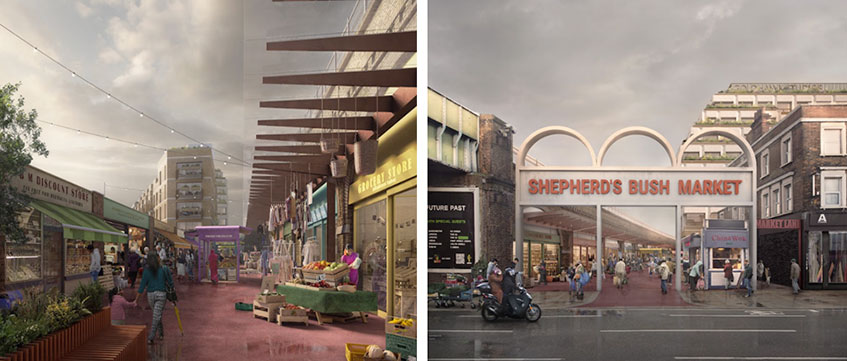Yoo’s Shepherd’s Bush Market scheme slated for approval
Yoo Capital’s plans for the redevelopment of Shepherd’s Bush Market, W12, have been recommended for approval.
Officers for the London Borough Hammersmith and Fulham said the 400,000 sq ft plans, which include a new 240,000 sq ft office building, lab space and 40 affordable homes, be approved, stating that the scheme would “retain and improve the vitality of Shepherd’s Bush Market”.
The council’s planning committee will vote on the scheme on 5 December.
Yoo Capital’s plans for the redevelopment of Shepherd’s Bush Market, W12, have been recommended for approval.
Officers for the London Borough Hammersmith and Fulham said the 400,000 sq ft plans, which include a new 240,000 sq ft office building, lab space and 40 affordable homes, be approved, stating that the scheme would “retain and improve the vitality of Shepherd’s Bush Market”.
The council’s planning committee will vote on the scheme on 5 December.
Yoo Capital became the majority owner of Shepherd’s Bush Market and the land next to it, known as the Old Laundry Yard, in September 2020, after buying a 75% stake from U+I. Since then it has been consulting on plans to redevelop the site, including the demolition of the former St Mungo’s hostel buildings, which are currently used as artists’ studios and creative workspace.
The application states that it is a “reprovision, refurbishment and reconfiguration” of the 4.2-acre site and market, as opposed to a redevelopment. But the scheme will include 400,000 sq ft of space, with a nine-storey commercial building designed by AHMM at its heart. The building, featuring a stepped-back series of roof gardens and terraces, will provide 240,000 sq ft of flexible workspace, as well as retail on the ground floor and a life sciences incubator run by Imperial College London in the basement.
To the north of this, a five-storey residential building will be built on the Old Laundry Yard site, containing 40 affordable homes.
Lloyd Lee, managing partner at Yoo Capital, said: “Our proposals preserve the area’s rich sense of culture and identity, while revitalising the infrastructure and buildings in a way that can attract more footfall and support local traders to grow their businesses. From day one of development, we will stand side by side with local traders and provide generous support to ensure the market remains the thriving heart of the local community.”
The borough’s planning officers have recommended approval, but acknowledged that “many issues have been raised by objectors to the scheme”, including 129 market stall holders, residents and businesses.
Some raised concerns that the office block was “out of scale” and “disproportionate” for the site. Another said “the office building will engulf, encroach, and overshadow the market space and materially alter its character”, and should be reduced in height or further stepped back.
Fears have also been raised that the market itself will be “gentrified and ruined”, resembling “two lines of shops” instead of a market.
A petition to “save the Shepherd’s Bush Market businesses” has garnered 14,231 signatures, although it has been going since 2015.
The council also received letters of support from 103 residents and businesses. Yoo Capital’s own consultation said that 54% were satisfied or happy with the commercial building, while 66% approved of the housing proposals. At a later consultation, 43% said they were happy with the market plans, with 39% neutral.
Yoo has previously stated that businesses in the market “are struggling”, and the rent and service charge collected does not cover operating costs, leaving a shortfall of approximately £200,000 a year.
As part of the development, long-term traders will either receive new units or a £10,000 investment in their unit. Rents will be frozen at 2015 levels until 2031 and no rent or service charge will be payable during market construction and business rates reimbursed.
The market dates back to around 1914, when it grew out of stalls in the railway arches. It was sold by Transport for London in 20111, and outline planning was granted in 2012 for 212 homes and 150,000 sq ft of commercial space. Ultimately, the 2012 scheme did not come forward following the failure to secure a compulsory purchase order and the permission expired.
The St Mungo’s buildings, formerly a hostel for the homeless, and shipping containers on the site were granted full planning permission to be used as creative workspace and artist studios, which was extended to December 2024.
To send feedback, e-mail piers.wehner@eg.co.uk or tweet @PiersWehner or @EGPropertyNews
Images © Yoo Capital/AHMM











